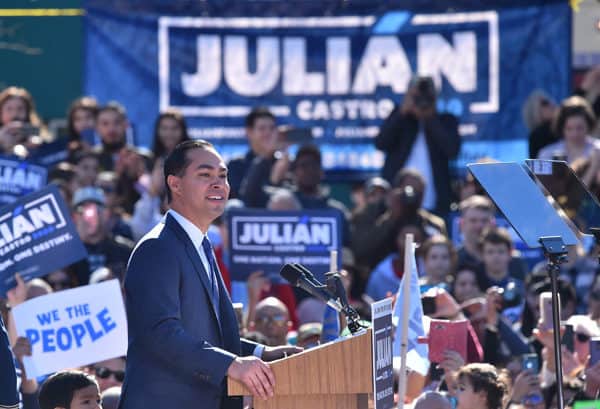Julián Castro on Why the Presidential Primary Season Needs a Shake-Up
Michelle Ruiz, Vogue, November 12, 2019

Julián Castro (Credit Image: © Robin Jerstad / ZUMA Wire)
Julián Castro isn’t one to hold back. The former Housing and Urban Development secretary under President Obama was the first 2020 candidate to propose decriminalizing border crossing; other hopefuls, like Elizabeth Warren, followed suit. On the popularity of Pete Buttigieg, another young mayor turned 2020 hopeful, Castro recently quipped on The Daily Show: “I was mayor of a city that’s 14 times larger than South Bend. In fact, we could almost fit South Bend in our Alamodome in San Antonio.”
This week Castro is doing what few candidates laser-focused on winning would dare to do: question the fairness of the presidential primary system itself. Specifically, he is noting that Iowa and New Hampshire, the two big, bellwether states whose voters largely determine who has the White House goods, are lacking in racial and ethnic diversity. Iowa, which famously holds the first caucus of the primary season, is about 91% white while New Hampshire is 94% white.
“I actually do believe that we do need to change the order of the states,” Castro said in an interview with MSNBC on Sunday from, yes, Iowa. “Demographically, it’s not reflective of the U.S. as a whole, certainly not reflective of the Democratic Party, and I believe other states should have their chance.”
{snip}
“We can’t go around thanking black women for powering Democrats to victory all over the country and then at the same time, hold our first caucus and our first primary in states that have almost no African-Americans,” Secretary Castro told Vogue. “We’re right to call Republicans out when they suppress the votes of African-Americans or Latinos, but we’ve also got to recognize that this 50-year-old process was created during a time when minority voices had zero power in the party.” (Iowa initially began going first in 1972.)
Castro concedes that the third and fourth primary states, Nevada and South Carolina, which come almost a month later, are more racially diverse. But he also says that the first states of primary season can make or break a candidate’s momentum. “Nobody can pretend that the first one or two states don’t have an oversized influence on what happens in the whole process,” he said. “If you can’t do well in Iowa or New Hampshire, then the chances of doing well in Nevada or South Carolina are much slimmer.”
{snip}
“My hope is that all Democrats, no matter where they’re from, will recognize the larger point here. We have to provide the most fair representative process to candidates and voters we can possibly provide,” he said. “And putting Iowa and New Hampshire first and second is certainly not it—no offense to those states.”
{snip}















